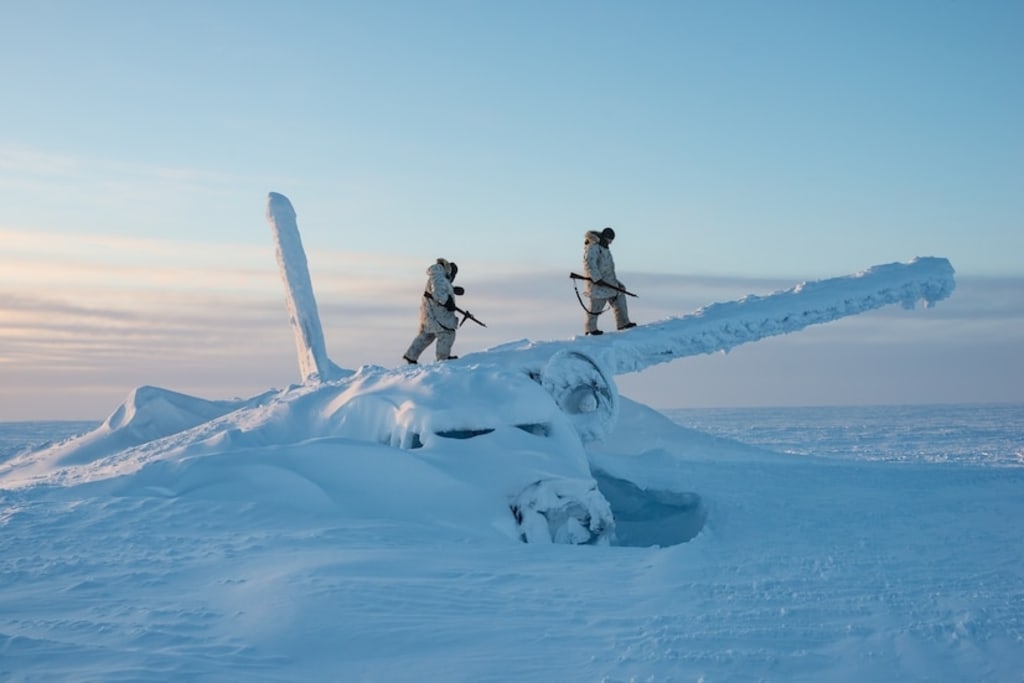
Late on a gray November afternoon Marvin Atqittuq, a newly elected patrol commander in the Arctic community of Gjoa Haven, stood on the frozen sea outside town and called his troops in for a meeting. A frigid wind flicked snow in from the south, and it was about 20 below zero, cold but not that cold for the Arctic. The company of some 20 Inuit men and a few women gathered around with rifles slung over their shoulders, dressed in hand-sewn jackets of caribou hide or pants made of polar bear fur or wearing the usual store-bought stuff, which was far less warm but namuktuk, good enough for now.
Atqittuq (pronounced At-kee-TUK) pulled on a pair of sealskin gloves and outlined the plan for the day. The group was part of the Canadian Rangers, a reserve component of Canada’s armed forces, and Atqittuq would now lead them on his first mission as their commander: a weeklong patrol by snowmobile down the treeless coast of King William Island. There would be GPS training, military-style target practice, search-and-rescue scenarios, and plenty of hunting and ice fishing.
I stood at the edge of the circle, rubbing ice from my eyelashes. It was too cold to take notes, so I watched faces and read the frostbite scars, little badges of honor that told of lives spent outdoors on one of the planet’s most unyielding landscapes. The group soon broke up and began smoking last cigarettes before the long ride into darkness. Atqittuq walked over to ask whether I was warm enough. He was tall, broad shouldered, laughed easily. He’d been a ranger for many years before the others had voted him their new commander. In a friendly way, he warned me not to fall asleep on the journey ahead. It happened, he said. Sometimes people tumbled off their snowmobiles and went missing. He reminded me that there was currently no cell service on the island or anywhere else in the territory of Nunavut—three times the size of Texas. “If anything happens and you get separated, just sit tight till someone comes back for you,” he said. “And try not to meet any polar bears.”
The rangers are called “Canada’s eyes and ears in the north,” and their units have been patrolling the country’s outermost regions since the 1940s. Most rangers in the far north are indigenous volunteers, and over the years they’ve acted as scouts, participated in war games, and helped regular troops learn to build igloos, navigate the tundra, and generally stay alive in the cold. Their role, like the far north itself, isn’t well-known, and the rangers have always managed to keep going on shoestring budgets and hand-me-down equipment, including government-issued bolt-action rifles made in the 1940s and stamped with the British crown.
Around the time of my visit, though, the Canadian government had been reappraising the rangers. Rumblings about an international scramble to stake new claims in the warming Arctic and on its vast trove of untapped resources had prompted politicians in Ottawa to promise the rangers better gear and funds to recruit more volunteers. Meanwhile U.S. military officials also were interested in the program, with an eye toward creating something similar in Alaska. Atqittuq welcomed the attention. He was raised in the Arctic and was now raising his own son there, so he understood the different ways the far-off government could go from friendly to fickle to forgetful. But this time it wasn’t hard to guess what was on politicians’ minds: After years spent ignoring the fact that the Arctic is warming faster than any other place on the planet, Canada was finally coming around.
“We Inuit have been talking about this climate change stuff for a long time,” Atqittuq told me before we headed out onto the tundra. “Now the government’s catching up, and they want us to keep a lookout. Well, OK. We’re proud Canadians.” Then he grinned. “Just wish we were Canadian enough to get good phone service, eh?”
About the Creator
Adams
writer | artist | chef
Enjoyed the story? Support the Creator.
Subscribe for free to receive all their stories in your feed. You could also pledge your support or give them a one-off tip, letting them know you appreciate their work.





Comments
There are no comments for this story
Be the first to respond and start the conversation.